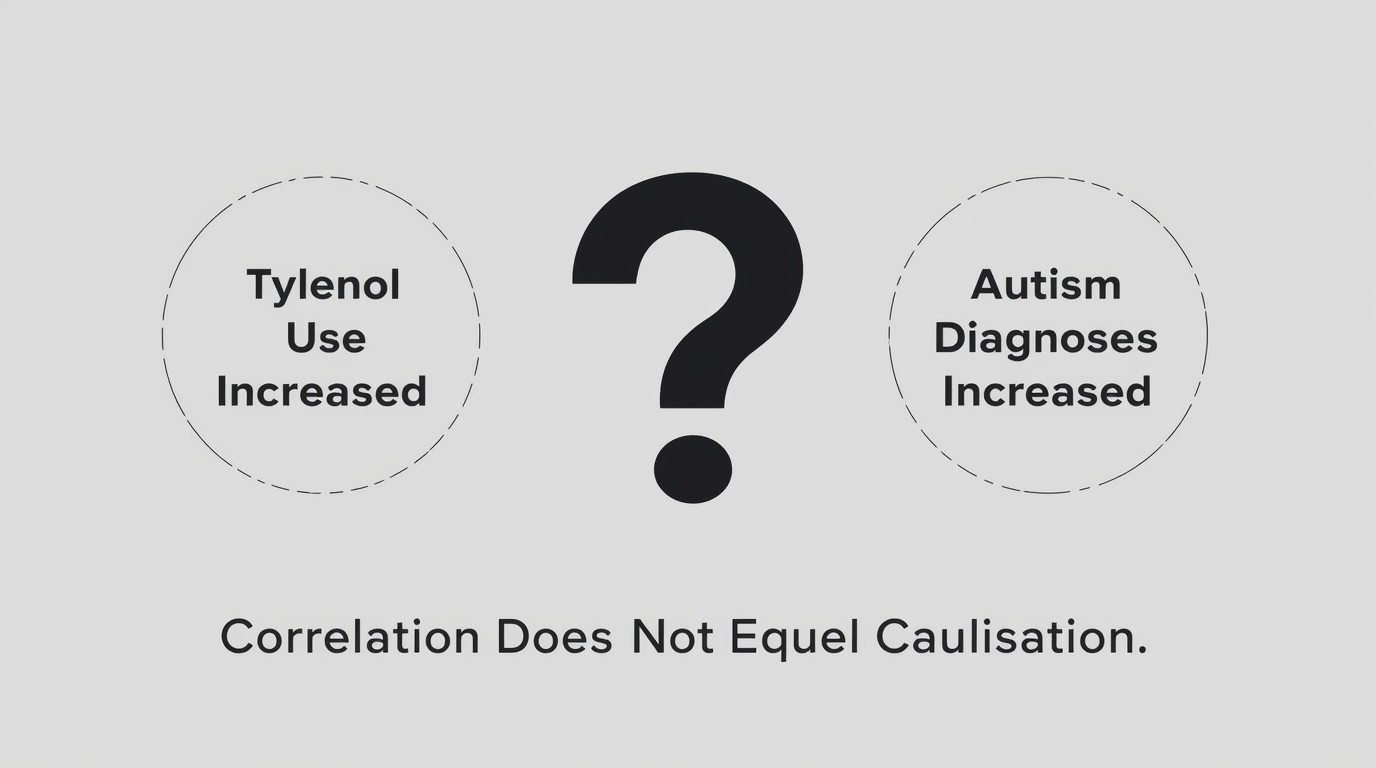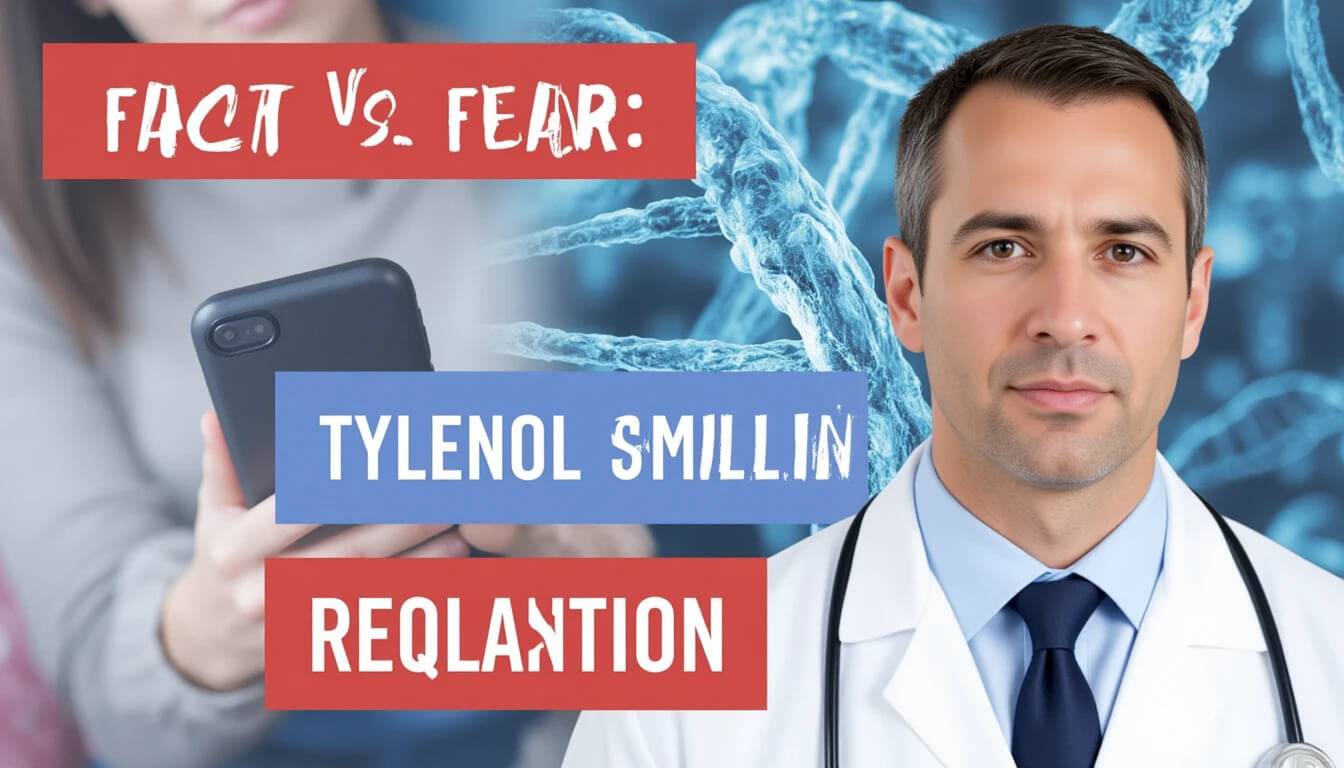A former FDA Commissioner weighs in on the controversial link, providing clarity and guidance for families navigating frightening headlines about autism.
It’s a headline that can stop any parent’s heart: a common, trusted medication potentially linked to a life-altering condition. Recently, claims made by Robert F. Kennedy Jr. suggesting a connection between the use of Tylenol (acetaminophen) during pregnancy and the rise in autism spectrum disorder have spread rapidly online, causing widespread anxiety. When information like this circulates, it’s difficult to separate fear from fact. That's why listening to trusted medical experts is more critical than ever.
Dr. Scott Gottlieb, a physician and the former Commissioner of the Food and Drug Administration (FDA), has directly addressed these claims. His perspective is grounded in scientific evidence and a deep understanding of public health. For any family touched by autism or concerned about making the safest choices, this clarification is essential.
In this comprehensive post from Care and Prayer, we will break down the entire situation. You will gain a clear understanding of:
-
The specific claims being made about Tylenol and autism.
-
Dr. Scott Gottlieb’s direct response and expert analysis.
-
The current scientific consensus on the matter.
-
Actionable guidance for parents on how to navigate health information responsibly.
Understanding the Controversy: What RFK Jr. Claimed About Tylenol and Autism
The core of the recent concern stems from assertions made by Robert F. Kennedy Jr., who has pointed to litigation and a handful of observational studies to suggest a causal link between prenatal exposure to acetaminophen (the active ingredient in Tylenol) and an increased risk of autism spectrum disorder (ASD) and ADHD in children.
These claims often highlight that the rise in autism diagnoses over the past few decades has coincided with the widespread recommendation of Tylenol over aspirin for children and pregnant women. The argument is that this correlation implies causation—that one directly caused the other. This narrative has understandably created significant fear and confusion for expectant parents who have long been told acetaminophen is one of the safest options for pain and fever relief.

The Expert’s Rebuttal: Dr. Scott Gottlieb’s Fact-Based Reaction
As a former FDA Commissioner, Dr. Scott Gottlieb’s role was to oversee the safety and efficacy of drugs in the United States. His analysis is rooted in rigorous scientific standards.
When asked about the Tylenol-autism claims, Dr. Gottlieb was clear and direct. He emphasized that the scientific community has not established a causal link. Here are the key points of his response:
-
Weak Evidence: Dr. Gottlieb stated that the data supporting this claim is "very weak" and primarily based on "observational and ecological studies." This type of research can identify trends or associations but cannot prove that one thing causes another.
-
The Problem of Confounding Factors: He explained that many other variables—known as confounding factors—could be at play. For example, the underlying reason a pregnant person might be taking Tylenol, such as a high fever or a viral infection, could itself be an independent risk factor. It is incredibly difficult to isolate the medication as the sole cause.
-
Scientific Consensus is Lacking: Critically, Gottlieb pointed out that there is no broad consensus within the medical or scientific communities that Tylenol causes autism. Major regulatory bodies like the FDA have not changed their guidance, which is a telling sign. They constantly review safety data, and a serious risk would trigger an official warning.
-
The Dangers of Untreated Fever: He also highlighted the well-established risks of not treating a high fever during pregnancy, which can have serious consequences for fetal development. The known danger of an untreated maternal fever is far more concrete than the speculative risk of acetaminophen.
In essence, Dr. Gottlieb’s message is a call for caution against accepting alarming headlines at face value. He urges the public to trust the rigorous processes that regulatory agencies and major medical bodies use to evaluate drug safety.
"You need to look at what the causes are that are leading women to take Tylenol… is there something about that underlying condition that is also associated with the outcome that you’re worried about?" - Dr. Scott Gottlieb (Paraphrased for clarity)
Correlation vs. Causation: Why Scientists Urge Caution
One of the most important concepts to grasp in this discussion is the difference between correlation and causation.
-
Correlation: This simply means two things are happening at the same time or in a similar pattern. For example, ice cream sales and shark attacks both increase in the summer. This is a correlation.
-
Causation: This means that one thing directly causes another. Eating more ice cream does not cause more shark attacks. The actual cause is the warmer weather (the confounding factor), which leads more people to swim and buy ice cream.
The argument linking Tylenol and autism is a classic case of confusing correlation with causation. While both Tylenol use and autism diagnoses have increased, this does not prove a link. There are countless other factors that have also changed in that time, from environmental exposures to, most significantly, a much broader and more accurate diagnostic criteria for autism.
What Do Major Health Organizations Say?
It's not just Dr. Gottlieb. Leading medical institutions have reviewed the available data and have not changed their recommendations.
-
The American College of Obstetricians and Gynecologists (ACOG): ACOG has stated that the studies on this topic have significant limitations and do not provide clear evidence of a direct link. They continue to advise that acetaminophen is a safe medication choice during pregnancy and caution patients not to be swayed by flawed research.
-
The U.S. Food and Drug Administration (FDA): The FDA's official stance has remained consistent. They have found the available studies to be inconclusive for determining a causal relationship.
Both organizations stress the importance of discussing any medication use with a healthcare provider to weigh the individual benefits and risks.
Navigating Health Scares: A Guide for Concerned Parents
At Care and Prayer, we understand that your primary instinct is to protect your family. Here’s how you can navigate confusing health news with confidence:
-
Consult Your Doctor First: Before changing any medication regimen, especially during pregnancy, speak with your OB-GYN or family doctor. They know your health history and can provide personalized, evidence-based advice.
-
Look at the Source: Consider where the information is coming from. Is it a peer-reviewed scientific journal and a major medical institution, or is it a social media post, a fringe news site, or a group promoting litigation?
-
Check for Consensus: Look for what major health organizations like the CDC, FDA, ACOG, and the American Academy of Pediatrics (AAP) are saying. Scientific consensus from multiple expert bodies is far more reliable than a single study or a lone voice.
-
Understand the Type of Study: Learn to recognize the difference between strong evidence (like randomized controlled trials) and weaker evidence (like observational or ecological studies).
2. Why are these claims about autism being made now?
These claims have surfaced primarily in conjunction with lawsuits and are being amplified by figures known for questioning established medical science. This often gains traction online, where fear can spread faster than fact-checking.
3. Is it safe to take Tylenol during pregnancy?
Leading medical bodies like ACOG still consider acetaminophen to be one of the safest over-the-counter pain and fever reducers for use during pregnancy when taken as directed and for appropriate reasons. The risks of an untreated high fever can be significant. Always consult your doctor.
4. What does cause autism?
Scientists believe that autism spectrum disorder is caused by a combination of genetic and environmental factors. It is a complex neurodevelopmental condition, and there is no single known cause. It is definitively not caused by bad parenting or, according to robust evidence, by routine vaccinations.
5. What should I do if I took Tylenol while I was pregnant and I’m now worried?
It is completely understandable to feel concerned. Please speak with your pediatrician about your child's development. Remember that millions of women have safely used acetaminophen during pregnancy for decades, and the overwhelming majority of their children are healthy and neurotypical. Worrying about past decisions is a heavy burden, so seek reassurance from a trusted healthcare provider.
Navigating the world of parenting in the digital age is challenging. Alarming headlines about things as common as Tylenol and conditions like autism can be deeply unsettling. However, as Dr. Scott Gottlieb’s reaction demonstrates, it is crucial to lean on evidence, expert consensus, and calm, rational analysis.
The key takeaway is this: the claims linking Tylenol to autism are not supported by strong scientific evidence. Leading medical experts and regulatory bodies have not changed their guidance. The most loving and responsible action you can take is to partner with your doctor to make informed health decisions for you and your family, grounding your choices in established science rather than internet-fueled fear.
At Care and Prayer, we stand with you. We encourage you to seek out trusted information, lean on your faith, and connect with your community.
What are your thoughts on this topic? Please share them respectfully in the comments below or share this article to help other parents find clarity.
The Care and Prayer Team is a dedicated group of writers, parents, and wellness advocates committed to providing faith-centered, evidence-based content that supports and empowers families. We believe in nurturing the spirit and informing the mind to navigate life’s challenges with grace and confidence.
